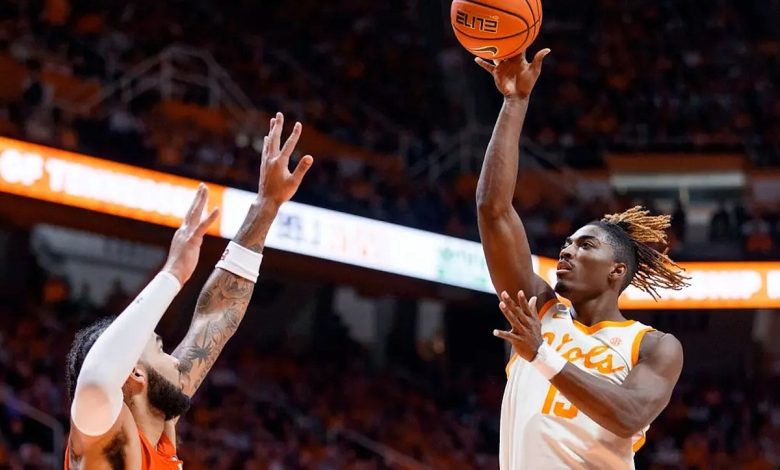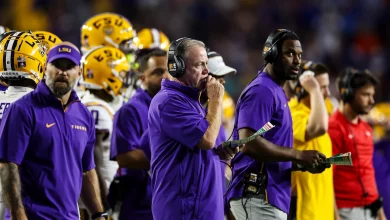Pearl of Auburn claims that playing Barnes of Tennessee is “no fun.”

In the ever-competitive world of college basketball, few rivalries in the Southeastern Conference (SEC) are as intense and exciting as the one between Auburn and Tennessee. While the competition between these two teams has often been fierce, one coach in particular, Bruce Pearl of Auburn, recently made a statement that captured the attention of fans and pundits alike: playing against Tennessee’s coach, Rick Barnes, is “no fun.”
Pearl, whose high-energy coaching style and fast-paced offense have made Auburn a consistent contender in the SEC, made this remark following yet another hard-fought game between Auburn and Tennessee. His comments weren’t just a critique of the game’s intensity, but an acknowledgment of the unique challenges that Tennessee’s basketball program presents under Barnes. The statement, while humorous in its delivery, shed light on the deeper complexities of playing against a team coached by Barnes, and it provided insight into why Tennessee has been so successful in recent years.
So, what makes facing Rick Barnes’ Tennessee team such a challenging experience? And why did Bruce Pearl feel compelled to express that playing against Barnes is “no fun”? To understand these comments and the rivalry between the two programs, it’s important to dive into the philosophy of both coaches and the styles of play they instill in their teams.
The Rivalry: Auburn vs. Tennessee
The rivalry between Auburn and Tennessee is a fierce one, fueled by competition, talent, and a shared desire to dominate the SEC. In recent years, both programs have been in the hunt for SEC championships and NCAA Tournament bids, making their meetings highly anticipated each season. While Auburn’s style of play leans heavily on an up-tempo offense that focuses on scoring quickly and efficiently, Tennessee’s approach under Barnes is far more methodical, emphasizing stifling defense and disciplined play.
These contrasting styles create an intriguing dynamic whenever these two teams meet. Auburn thrives in high-scoring, fast-paced games, where they can use their athleticism and depth to outpace opponents. On the other hand, Tennessee is built around a rugged defensive system that forces turnovers, creates chaos, and slows down the tempo. This difference in philosophy often leads to a clash of styles when the two teams face off, resulting in games that are intense, physical, and sometimes unpredictable.
For Auburn, facing Tennessee has often meant going up against a team that is difficult to break down on both ends of the floor. Whether it’s dealing with Tennessee’s swarming defense or trying to solve the riddles presented by Barnes’ strategic adjustments, playing against Tennessee has been a frustrating experience for many teams in the SEC. For Bruce Pearl, whose teams pride themselves on their fast breaks and high-scoring affairs, facing Barnes’ Tennessee squad has proven to be a particularly tough challenge.
Rick Barnes’ Coaching Philosophy
To understand why playing against Rick Barnes’ Tennessee team is “no fun,” it’s crucial to look at the key elements of Barnes’ coaching philosophy. Barnes, one of the most respected figures in college basketball, has built a program in Tennessee that is defined by toughness, defense, and discipline. His teams are known for their ability to suffocate opponents with physical play and make games difficult for anyone who faces them.
Elite Defense
The hallmark of Barnes’ Tennessee teams has been their elite defense. Tennessee’s defense has become one of the most feared in the country, and it’s a major reason why the Volunteers have been so successful in recent years. Barnes emphasizes the importance of defensive fundamentals, including guarding without fouling, closing out on shooters, and contesting every shot. His defensive system is designed to disrupt the rhythm of opponents, forcing them into uncomfortable situations. For teams like Auburn, which relies on fast breaks and high scoring, facing such a defense is a daunting task.
Tennessee’s defense doesn’t just stifle opposing offenses; it actively generates offense for the Volunteers by creating turnovers and forcing opponents into bad shot selections. Barnes has instilled a mindset in his players that emphasizes relentless effort on the defensive end, and it’s paid off in spades. Whether it’s through man-to-man defense, aggressive ball pressure, or suffocating help defense in the paint, Tennessee’s defense makes life difficult for opposing teams. For an offensive-minded coach like Pearl, trying to crack Tennessee’s defense can be incredibly frustrating, especially when his players are used to playing at a faster tempo.
Physicality and Toughness
Another key component of Barnes’ coaching style is his emphasis on physicality and toughness. Tennessee’s teams are built to withstand physical battles, and they have the strength and resilience to impose their will on opponents. This physicality manifests itself in every aspect of the game—whether it’s through tough rebounding, aggressive on-ball defense, or the ability to take charges in crucial moments. For teams that rely on finesse or speed, facing a team like Tennessee can feel like running into a brick wall.
Auburn’s players are known for their athleticism and ability to make quick, explosive plays, but when they face Tennessee, that style of play is often neutralized by the Volunteers’ grit and physical play. Barnes has created a culture where his players understand the importance of getting into the paint, battling for every loose ball, and using their physical strength to impose their will on the game. This style can be frustrating for coaches like Bruce Pearl, whose teams prefer a more up-tempo, free-flowing style of play. In this regard, Barnes’ teams are a stark contrast to Pearl’s, which is part of the reason why their meetings are so intense and hard-fought.
Efficiency and Execution
While Auburn may thrive on scoring quickly and taking risks, Tennessee under Barnes focuses on efficiency and execution. The Volunteers are a well-coached, disciplined team that values ball movement, smart shot selection, and minimizing turnovers. Barnes’ teams are patient offensively, working to get high-quality shots instead of forcing bad ones. This methodical offensive approach contrasts sharply with Auburn’s fast-paced, high-pressure offense, and it often forces opponents to play at a slower pace than they’d like.
For Bruce Pearl, whose philosophy revolves around creating chaos and playing fast, playing against a team that emphasizes execution and efficiency can be a tough adjustment. Tennessee forces their opponents to slow down, think carefully, and execute their offense with precision—qualities that can frustrate teams accustomed to a more free-flowing style of play. In many ways, playing against Barnes and Tennessee is like playing a chess match, where every move is calculated and well-thought-out.
Bruce Pearl’s Perspective: “No Fun” but Full of Respect
Bruce Pearl’s comment that playing against Rick Barnes’ Tennessee team is “no fun” was made with a tone of respect, even as it highlighted the challenges his Auburn team faces when squaring off against the Volunteers. While Pearl’s teams may prefer a more fast-paced and chaotic game, they are frequently forced to adapt to the style of play that Barnes’ Tennessee teams impose. Pearl’s “no fun” comment wasn’t necessarily a complaint—it was a recognition of how difficult and demanding playing against Tennessee can be.
Auburn and Tennessee’s meetings have often been intense and physically demanding, with both teams bringing their best efforts to the court. For Pearl, playing against a coach like Barnes, who is known for his tactical acumen and defensive prowess, is a reminder of the work that still needs to be done to build a championship-caliber team. While the game may not be “fun” in the conventional sense—due to the sheer physicality and intensity—it’s clear that Pearl respects the challenge that Barnes presents.
The Rivalry Moving Forward
The rivalry between Auburn and Tennessee shows no signs of slowing down, especially as both programs continue to build their teams for the future. Auburn, under Pearl’s leadership, has consistently recruited well and developed a roster capable of competing for SEC titles and NCAA Tournament bids. Tennessee, meanwhile, remains a perennial contender under Barnes, with a team that consistently plays at a high level and challenges the best programs in the country.
For fans of both teams, the games between Auburn and Tennessee will continue to be must-watch events, filled with drama, intensity, and high-level basketball. While both teams bring different styles to the court—Auburn with its up-tempo offense and Tennessee with its suffocating defense—the rivalry is one that adds excitement to the SEC and provides a glimpse into the future The Challenge of Facing Rick Barnes
Bruce Pearl’s remark about playing against Rick Barnes and Tennessee being “no fun” is a testament to the challenges that Barnes has created for his opponents. Barnes’ coaching philosophy is rooted in defense, physicality, and efficiency—qualities that make his Tennessee teams difficult to beat. While the game may not be “fun” in the traditional sense, facing a team like Tennessee is undoubtedly a challenge that coaches like Pearl respect and work tirelessly to overcome.
In the end, though, the rivalry between Auburn and Tennessee is built on mutual respect. Pearl knows that facing Barnes’ Tennessee squad is a difficult task, but it’s one that helps his own team grow and develop. As both teams continue to battle for supremacy in the SEC and beyond, the competition will only continue to intensify, with each game providing another opportunity for greatness.









